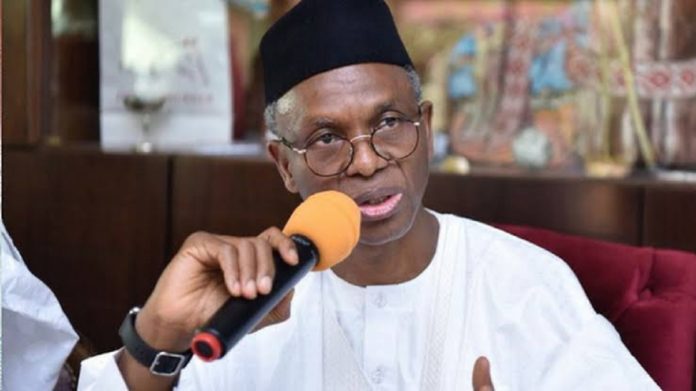By: Daure David
In recent times, Governor Nasir El-Rufai of Kaduna State has been vocal about a sentiment that Southern Kaduna harbors disdain for him. According to him, the people of the region despise him, their votes are of little significance, and they are an impediment to his administration’s political success. However, it is crucial to dissect this claim through the lens of history, voting patterns, and the state of leadership under El-Rufai, as his tenure is a reflection of how political dynamics have shifted, with much of the responsibility lying squarely on his shoulders.
Before 2015, Southern Kaduna had long been a stronghold of the People’s Democratic Party (PDP). In the years leading up to 2015, the region consistently supported the PDP with overwhelming votes. In 2003, Governor Ahmed Makarfi of the PDP secured a landslide victory with 1,143,890 votes, leaving his closest contender, Suleiman Hunkuyi of the ANPP, far behind with 668,446 votes. In 2007, Namadi Sambo followed suit, securing 1,326,632 votes, again defeating the closest opposition by a huge margin. The trend continued in 2011, when the late Governor Patrick Yakowa triumphed with 1,334,319 votes, fending off Haruna Sa’eed of the CPC. Southern Kaduna’s allegiance to the PDP was unwavering, a political trend that defined the region for decades.
Then came 2015, when for the first time, the region broke from its long-standing voting tradition. Southern Kaduna voted for El-Rufai in the gubernatorial election. The shift was evident, with voters splitting their support between the APC and the PDP. In key local government areas, like Chikun, Jema’a, and Kaura, the APC secured significant votes, with El-Rufai gaining a substantial number of supporters who had long aligned with the PDP. For example, in Chikun, El-Rufai garnered 36,920 votes, compared to the 27,248 for PDP. Similarly, in Jema’a, the APC managed to secure 36,760 votes while the PDP had 45,272. This marked a significant departure from the status quo, as Southern Kaduna, traditionally a PDP stronghold, leaned toward the APC for the first time.
El-Rufai’s victory in 2015 was not just a personal triumph but also a watershed moment in Southern Kaduna’s voting history. Governor El-Rufai of the APC received 1,117,635 popular votes, while his PDP counterpart, Governor Ramalan Yero, managed only 485,833 votes. The shift in Southern Kaduna’s voting behavior was notable and unprecedented, and for many, this represented a high point of political engagement and political change in the region. However, this newfound allegiance to El-Rufai would quickly sour, and the political goodwill extended to him was soon squandered.
El-Rufai’s actions during his time in office have raised eyebrows, especially in the face of growing dissatisfaction in Southern Kaduna. His claim that the people of Southern Kaduna hate him flies in the face of the region’s historical support for him in 2015. It is not Southern Kaduna that is to blame for his leadership failings. Rather, El-Rufai’s disregard for the region’s values, traditions, and leadership has created a chasm between him and the people. One of the first signs of this disconnect was his actions against the traditional institutions in the region, a cornerstone of Southern Kaduna’s cultural fabric. The dethroning and imprisonment of traditional chiefs, coupled with his controversial changes to the titles of traditional institutions, alienated the people he once hoped to represent. His attempts to portray himself as the ultimate custodian of Southern Kaduna’s culture only further deepened the rift between him and the locals.
Moreover, El-Rufai’s lack of empathy towards the people of Southern Kaduna, who have been subjected to countless attacks by so-called “unknown gunmen,” has raised further concerns. His detached response to the suffering of these communities, including his dismissive stance towards their pleas for compensation, painted him as indifferent to their plight.
El-Rufai’s leadership mismanagement is evident in the 2023 elections, where the APC’s fortunes dramatically shifted. In 2015, the APC swept the polls, securing 1.1 million votes, two senators, and 10 House of Representatives seats. Fast forward to 2023, and El-Rufai’s party had lost all three senators to the PDP, along with 11 House of Representatives seats to both the PDP and the Labour Party. Additionally, the APC struggled to secure a simple majority in the governorship race, with the PDP gaining significant ground. If Southern Kaduna’s votes were indeed the source of the APC’s struggles, how can one explain the loss of political power across the state? El-Rufai’s failure to maintain his party’s dominance is indicative of broader leadership issues within his administration.
Governor El-Rufai’s leadership style, characterized by neglect, autocracy, and disregard for local cultures, contributed to the political erosion of his support base, especially in Southern Kaduna. The truth is that the region did not turn against El-Rufai in 2023 out of malice. Rather, it is a reflection of how his actions and governance alienated the very people who once supported him.
Southern Kaduna is not responsible for the APC’s political woes in the state. It is not responsible for the loss of Senate seats, House of Representatives seats, or even the governance crisis that ensued. If anyone is to blame for the disintegration of APC’s influence in the state, it is Malam El-Rufai and his flawed leadership.
In conclusion, Southern Kaduna’s support for El-Rufai in 2015 was a turning point in the region’s political history. However, it is also a testament to how leadership, or the lack thereof, can erode political goodwill. Instead of pointing fingers at Southern Kaduna, El-Rufai must take responsibility for his own actions and the political decline that followed. His failure to nurture and maintain the trust of the people he governs speaks volumes, and no amount of blame-shifting can change the reality of his leadership record.







